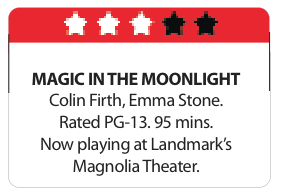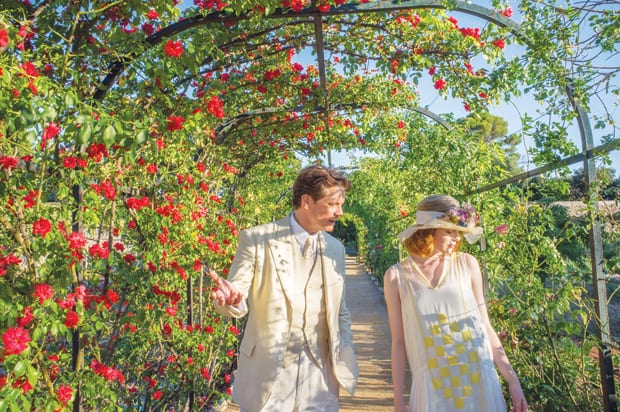Woody proves himself a Coward in a medium ‘Magic in the Moonlight’
 Many filmmakers are lovers of magic, probably because the professions of director and magician have similar skill sets: Adeptness at sleight of hand, misdirection and showing your audience only as much as they need to know for you to trick them. And they love it.
Many filmmakers are lovers of magic, probably because the professions of director and magician have similar skill sets: Adeptness at sleight of hand, misdirection and showing your audience only as much as they need to know for you to trick them. And they love it.
That also describes Stanley (Colin Firth), the curmudgeonly protagonist in Woody Allen’s new romantic comedy, Magic in the Moonlight. Stanley is a stiff, cynical Brit in 1920s Europe who has made his career pretending to be a Chinese mystic while hornswoggling an audience he seems to hold in contempt precisely because he can fool them. He’s a non-believer, a Jazz Age version of The Amazing Randi, who debunks those who claim to reach the spirit world. Stanley is enlisted by an old pal, Howard (Simon McBurney), to disprove the bona fides of a woman (Emma Stone) who seems to be the real deal: A psychic medium who talks to the Other Side, and is on her way to marrying a dimwitted young millionaire.
Superficially, Magic in the Moonlight has a mystery at its heart, but really, that’s just Allen’s own gesture toward misdirection: Get you thinking about whether she’s authentic while he’s actually charming you — and Stanley — into falling for her.
From The Help to the Spider-Man movies, Stone has perfected a goofy, naifish likeability that makes her both sexy and intellectually engaging. You sense there’s more going on under her snood than she let’s on, but it’s not coy and deceptive. You want her to be real, even though, like Stanley, you can’t subscribe to the fantasy.
Firth is a redoubtable Allen surrogate, undertaking the lead but — unlike many before him (Owen Wilson, John Cusack, Larry David, etc., with varying degrees of success) — he doesn’t try to “do” Woody. He’s a combination of a Noel Coward sophisticate (think Blithe Spirit) and Mr. Darcy. Allen gives him plenty of room to wander through his emotional repressiveness, appointing the film with gorgeous clothes and scenery (the once Big Apple-bound filmmaker now seems obsessed with the Old World). It’s a whimsy, a lark — and, like a seance itself, a wonderful waste of time, even if you don’t really believe in it.
This article appeared in the Dallas Voice print edition August 1, 2014.


